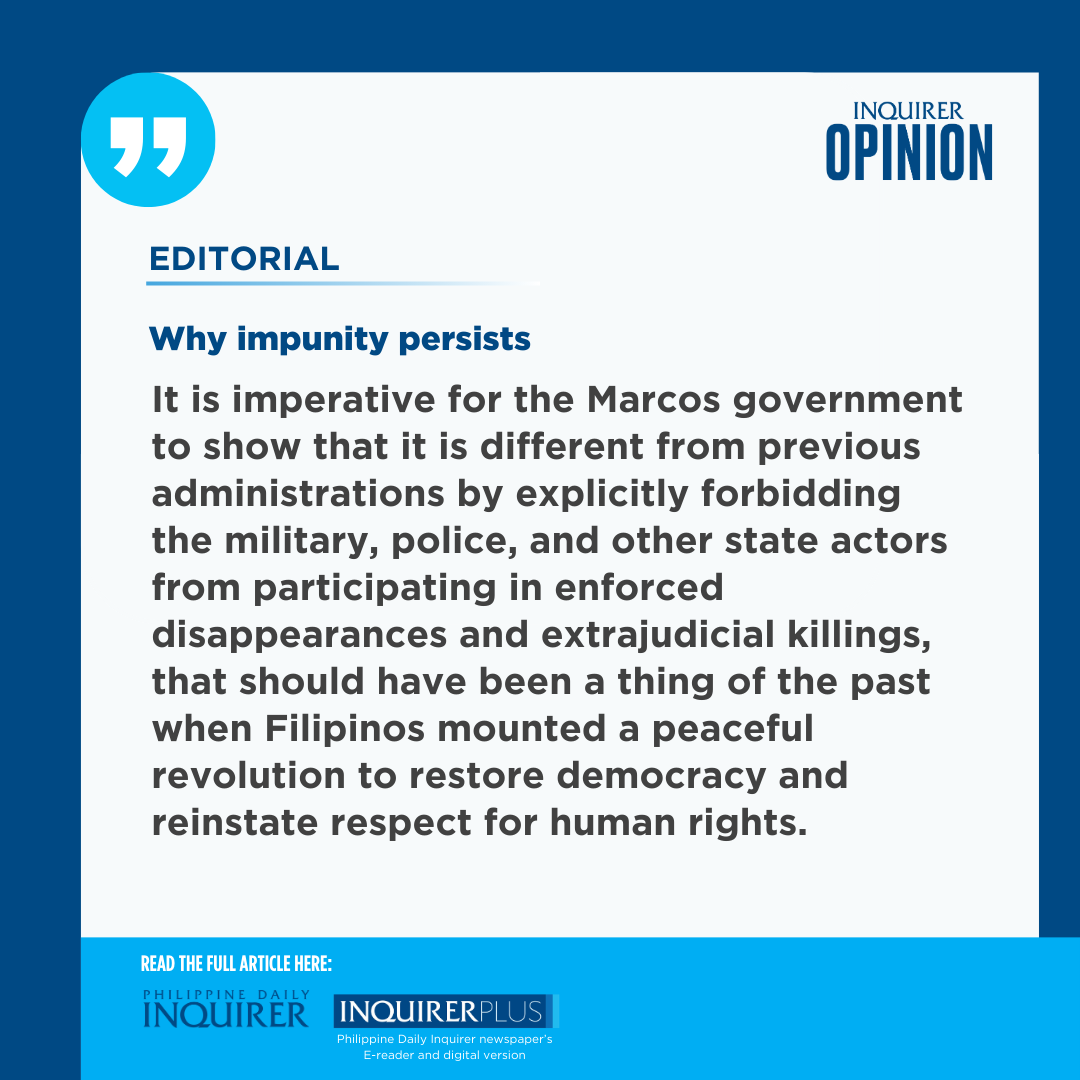Why impunity persists
It would have given the Marcos administration some measure of relief, if not amusement, to note that this year’s anniversary of the declaration of martial law has shifted focus to former president Rodrigo Duterte’s tyrannical rule, instead of the despotic regime of Ferdinand Marcos Sr.
“Under Duterte, ‘martial law’ ceased to be a term exclusively associated with [Marcos Sr.],” the human rights group Karapatan said in a statement during last Saturday’s observance of the 52nd year of the imposition of martial rule in 1972.
The group cited Duterte’s policies which spawned a wave of human rights violations, including his creation of the National Task Force to End Local Communist Armed Conflict (NTF-Elcac) that went about Red-tagging government critics and made them “vulnerable to human rights violations, such as arbitrary arrest and detention on trumped-up charges, enforced disappearance, or extrajudicial killing.”
Karapatan also cited Duterte’s Memorandum Order No. 32 that led to police and military crackdowns in Samar, Bicol, and Negros, and resulted in what the group said were some of the “worst human rights violations” in recent history.
Categorical policy
And how can anyone forget the extrajudicial killings of from 6,000 to 30,000 mostly poor individuals under the notorious Duterte war on drugs, which are now the subject of an investigation by the International Criminal Court?
But President Marcos can take little comfort in Duterte being the new symbol of rights violations. While largely seen as more benign compared to Duterte, or even his late father for that matter, Mr. Marcos has yet to make a categorical policy denouncing human rights violations particularly those committed by the uniformed services under his responsibility as commander in chief.
Recent cases and statistics show that enforced disappearances, allegedly by state forces, have continued unabated under Mr. Marcos’ administration. Karapatan noted the rising cases of extrajudicial killings, almost 60 last 2023 from 41 the previous year, and 11 enforced disappearances thus far in 2023.
The latest incidents involve activists James Jazmines and Felix Salaveria Jr., who were reportedly forced by armed men into their vehicles on Aug. 23 and Aug. 28, respectively, in Tabaco City, Albay.
‘Professional operation’
Jazmines, the younger brother of former National Democratic Front of the Philippines consultant Alan Jazmines, served as information officer of the League of Filipino Students and the Kilusang Mayo Uno. Salaveria is a founding member of indigenous rights groups Tunay na Alyansa ng Bayan Alay sa mga Katutubo and Kabataan para sa Tribung Pilipino.
The circumstances of their abduction have led their camps to believe that state agents were behind it, a chilling claim if validated. In a press conference by Karapatan on Monday, lawyer Tony La Viña said that CCTV footage around the area where the activists were taken showed the involvement of many vehicles, as well as lookouts, an indication that this was a “professional operation” involving lots of resources. “Military intelligence, police—[only] state-mandated agencies could do something as sophisticated as this,” La Viña said.
Karapatan secretary general Cristina Palabay said there were “commonalities” in the disappearance of Jazmines, Salaveria, and many others.
These recent cases are indeed troubling, as they indicate the continued impunity of state agents used to past regimes where human rights violations are condoned, if not encouraged.
Writ of amparo
It is imperative for the Marcos administration to show that it is different from previous administrations by explicitly forbidding the military, police, and other state actors from participating in enforced disappearances and extrajudicial killings, that should have been a thing of the past when Filipinos mounted a peaceful revolution to restore democracy and reinstate respect for human rights.
It can start by heeding the call of the Commission on Human Rights to strictly enforce Republic Act No. 10353, the Anti-Enforced or Involuntary Disappearance Act of 2012, which penalizes unlawful and arbitrary arrests or detention and abductions. A review of the NTF-Elcac’s mandate should be a logical next step.
The courts should also do their part by allowing individuals to effectively seek help in finding their loved ones. As Kristina Conti of the National Union of People’s Lawyers noted on Monday, no person has been found through the writ of amparo, which is a remedy for people threatened by an unlawful act or omission of a public official or a private entity.
The Armed Forces of the Philippines, the Philippine National Police, and the defense and interior departments that supervise these services should take the lead in surfacing Salaveria and Jazmines, as well as other missing activists, to show that the rule of law still prevails in the country.
They must also strongly denounce these acts of impunity and prove themselves true to their sworn duty as protectors—not abductors—of our people.





















